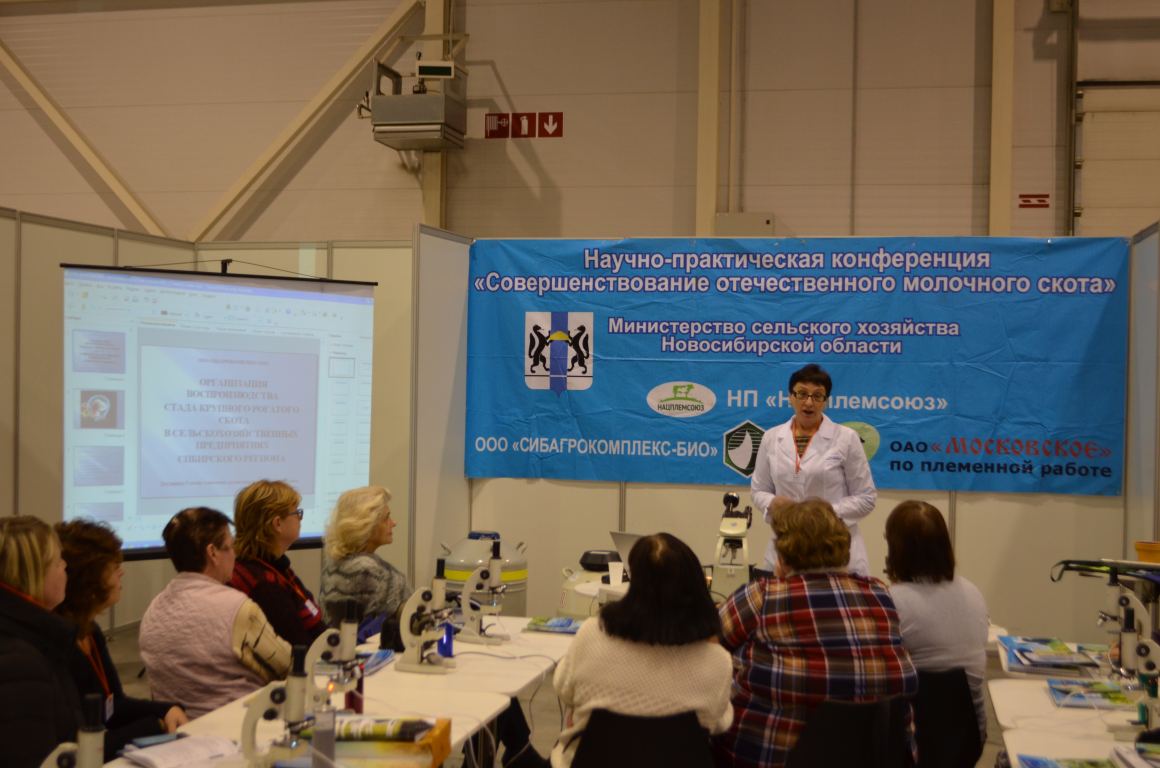November 2016, a series of conferences and exhibitions was held in the cities of Novosibirsk and Tomsk, where issues of the current state of breeding in livestock were discussed.
The international exhibition of agricultural machinery, equipment and materials for the production and processing of agricultural products 'AgroSib' (November 9-11, 2016) - the largest exhibition in Siberia, which took a direct part SIBAGROCOMPLEX Group (member of Omsky Biocluster). Within the framework of Novosibirsk agro-industrial forum, a large-scale event 'Siberian Power 2016' was held, where breeding animals of the best farms of Novosibirsk region were shown and conducted rapid training for livestock breeders, operators of artificial insemination and veterinary paramedics experts of SIBAGROCOMPLEX Group.
The head of the consulting service Olga Vasilyeva conducted a training on the methods for calculating the yield of calves (order No. 246 of the Ministry of Agriculture of the Russian Federation), the order and conditions for the assessment (order No. 379 of the Ministry of Agriculture of the Russian Federation), the new forms of pedigree certificates (order No. 232 of the Ministry of Agriculture Economy of the Russian Federation), amendments and additions to 'SELEKS' IAS.
Olga Vasilyeva also took part in the scientific-practical conference 'Improving the Domestic Dairy Cattle - the Basis of Food Security of the Russian Federation', organized by the Ministry of Agriculture of Novosibirsk region, the report 'Regional information and breeding center - integrator organization of breeding work in the region'. At the stand of SIBAGROCOMPLEX Group, a meeting was held with experts from farms in the Siberian Federal District.
The best practice of organizing cattle herds breeding was discussed in Tomsk region at the seminar 'Golden Autumn. Harvest-2016', dedicated to breeding on dairy farms. The seminar was organized by Agrarian Center of Tomsk region with the participation of the specialists of SIBAGROCOMPLEX Group and with the support of the Department of Social and Economic Development of the Village of Tomsk region. The seminar was attended by more than 70 livestock, breeders, veterinarians, managers of agricultural enterprises and specialists of regional departments of agriculture, as well as students of agricultural education institutions in the region. According to the head of the expert group of SIBAGROCOMPLEX Group for cattle breeding, Candidate of Agricultural Sciences Irina Yushkova, the requirements for the genetic potential of livestock in modern conditions have changed. Thus, the global emphasis is on the health of the offspring, while in Russia the main priority is still dairy production of cows. Irina Yushkova:
"In Russia in recent years, we are talking about the selection of cows to increase the protein content, although throughout the world this stage was in the 20s of the last century. At the same time, in Europe and the West as a whole, improving the genetics of livestock is aimed at improving the health and profitability of the cow, since the size of the enterprise's profits depends on the longevity of the cow. 100% artificial insemination of animals (at least 50% by bulls-improving breeds) are the minimum requirements to the farm while improving the genotypes of livestock. At the same time, buying seed of high-yielding bulls in foreign countries, it is necessary to take into account that the methodology of their evaluation in each country has its own peculiarities. It is important to be able to correctly 'read' the breeding index assigned to the animal. Indicators of health, productivity, longevity have a different proportion in different countries in the selection index. And this must also be remembered when selecting a bull."
Correct selection of the bull-producer will also allow to avoid inbreeding (related crossing) and genetic anomalies. As an example, experts of Omsk company cited the case in North America, when 75,000 cows-daughters inherited a mutant gene received from one bull producer. The genomic evaluation of animals, which is already used in many countries of the world, allows to reduce the risk of manifestation of hereditary anomalies. At the same time, the result obtained in the economy depends not only on the quality of the seed, but also of the conditions in which it is stored, as well as the professionalism of the operator for the artificial insemination of animals and birds. An analysis of the organization of the reproduction of a herd of cattle in Siberian agricultural enterprises was conducted by the head of the veterinary service of SIBAGROCOMPLEX Group Tatyana Evtushenko. She positively assessed the work of artificial insemination points in Tomsk farms, in particular, in Kuyendat Farm and Dubrovskoye JSC, calling them 'exemplary'."


